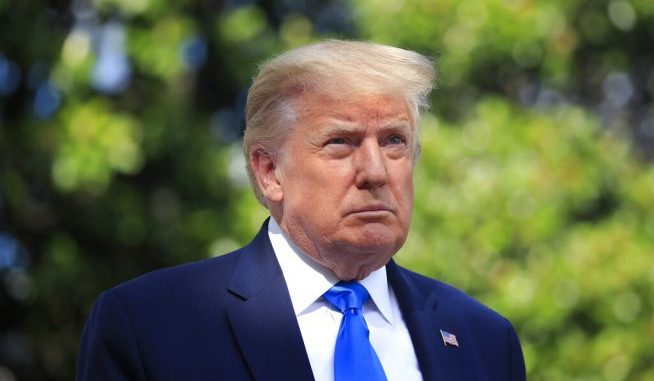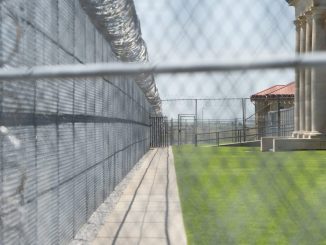

President Donald Trump walks over to speak to members of the media on the South Lawn of the White House in Washington, Saturday, July 11, 2020, before boarding Marine One for a short trip to Walter Reed National Military Medical Center in Bethesda, Md. (AP Photo/Pablo Martinez Monsivais)
OAN Newsroom
UPDATED 3:00 PM PT —Saturday, July 11, 2020
President Trump has signaled he is planning to sign an executive order on immigration reform. He made the announcement on Friday during an interview with Spanish language network Telemundo.
He has said the order will focus on instituting a merit based immigration system. The president also stated he would introduce a path to normalizing the immigration status of DACA recipients, who were brought into the U.S. illegally as children and have remained in the country since.
“What I’m going to do is there going to be part of a much bigger bill on immigration. It’s going to be a very big bill, a very good bill, a merit based bill and it will include DACA. I think people are going to be very happy with it. …We’re going to have a road to citizenship.” – Donald Trump, 45th President of the United States
Trump announces forthcoming executive order on immigration which will include addressing DACA, following Supreme Court ruling. @realDonaldTrump pic.twitter.com/xAaaJ7Usfb
— ????????Maggie VandenBerghe???????? (@FogCityMidge) July 10, 2020
While details on the planned order have not yet been revealed, the White House issued a statement following the president’s interview. In it, officials stated that while a “path to citizenship” was being considered, no general amnesty would be granted.

FILE – In this June 18, 2020, file photo, Deferred Action for Childhood Arrivals (DACA) students gather in front of the Supreme Court in Washington. (AP Photo/Manuel Balce Ceneta, File)
This followed expressions of worry from several prominent conservatives, including Sen. Ted Cruz (R-Texas). He voiced concern over Twitter, where he said it would be a mistake to extend unconditional amnesty by executive fiat.
There is ZERO constitutional authority for a President to create a “road to citizenship” by executive fiat.
It was unconstitutional when Obama issued executive amnesty, and it would be a HUGE mistake if Trump tries to illegally expand amnesty. #TellTheSwampNO #RuleOfLaw https://t.co/RLWuCgcNU6
— Ted Cruz (@tedcruz) July 10, 2020
The White House’s clarification, however, hinted any path to citizenship would not be automatic, but instead contingent on the merits of individual applicants. This system would be in line with a more general shift to merit based immigration policy, which has been a long-fixed feature of President Trump’s views on the subject.
“We expect that those who seek to join our society will obey our laws, revere our Constitution, cherish our history, support themselves financially, embrace our American values and love our American flag,” the president stated. “We believe in an immigration system based on merit…(and) we need workers, but they have to come in where they can help our country.”
The transition to a merit based immigration has been a long-term goal of conservatives in the U.S. for decades. Some have claimed focusing on recruitment of highly skilled foreign workers would be more beneficial to the economy than the current system, which has been in place since the 1960s and prioritizes family ties over individual qualifications.
Proponents argued a merit based system would reduce overall immigration rates and prevent a high influx of low skill workers from pushing down wages in key industries. Moreover, highly skilled workers tend to be more financially secure and thus, according to advocates of merit based immigration reform, are less likely to rely on public assistance.

FILE – In this March 18, 2020, file photo, a Border Patrol agent walks along a border wall separating Tijuana, Mexico, from San Diego, in San Diego. (AP Photo/Gregory Bull, File)
The president cited the recent Supreme Court decision on DACA, which determined that while the specific action under review could not be upheld due to procedural reasons, President Trump does have the authority to introduce modifications to the program.
“If you look at the Supreme Court ruling, they gave the president tremendous powers when they said that you could take in, in this case, 700,000 or so people,” he added. “So they gave powers, and based on the powers that they gave, I’m going to be doing an immigration bill.”
A specific timeline for the executive order was not issued, but the president did suggest it would be outlined “over the next few weeks.”






Be the first to comment